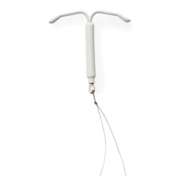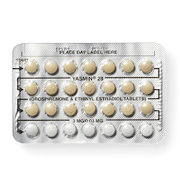Birth control and your period
Will birth control change my period? Depending on your method, it might.

It’s pretty common for hormonal birth control (pill, ring, patch, shot, implant, and hormonal IUD) and non-hormonal IUD to affect your period. Depending on your birth control choice, your period could get lighter or heavier, come more or less often, or go away altogether. While these types of changes to your period might be cause for concern if you’re not on birth control, when birth control changes your period in these ways, it’s safe and normal. Whether you’re choosing a new birth control method or just trying to troubleshoot your current one, read on to get the inside info on what to expect.
Is it dangerous to have an unpredictable, irregular period (or not have a period at all) when I’m using birth control?
This is a common worry for people using birth control, but luckily, changes to your period because of birth control aren’t dangerous at all! These changes are just a side effect of the birth control itself—the same hormones or materials that help you avoid pregnancy can also change your period. These changes don’t increase your risk of getting a sexually transmitted infection, and they don’t change your chance of getting pregnant in the future—your body remains healthy even if your period isn’t exactly the same.
In fact, sometimes having lighter (or no) periods is actually healthier! For people who have anemia (low red blood cell levels that can cause fatigue), having less bleeding while using birth control can help your body recover. We’ve also learned that many types of birth control decrease your long-term risks of certain kinds of cancer. Bonus!
How exactly will my birth control change my periods?
It depends on what kind of birth control you choose! Birth control that has hormones (like the pills, patch, ring, hormonal IUD, and implant) tend to make people have less bleeding overall, but sometimes that bleeding isn’t predictable. That means you might have small amounts of bleeding throughout the month, two or more times when you bleed each month, or even no bleeding at all. This is especially true during the first few months of starting a new birth control method, as your body is getting used to it.
The pill, the ring, and the patch:
During the first few months: Usually you’ll have a light period once a month while taking the placebo pills (or during the off time between rings or patches). It’s also common and normal to have bleeding between periods during the first few months of using these methods.
After the first three months: Usually you’ll have a light, predictable period once a month during the placebo pills or off time.
Pro Tip: For people who use the pill, ring, or patch continuously, you probably won’t have a period at all, or just very light bleeding every so often. This is also totally safe.
Hormonal IUDs or the implant:
During the first few months: It’s common to have light, irregular spotting or bleeding that’s hard to predict. Sometimes you’ll have light bleeding or bleeding that lasts for more days than your regular period.
After the first three months: Your bleeding will stay light, and sometimes your period stops entirely. Studies have found that most implant users report that they like their bleeding patterns better the longer they use their implants. And the longer you use the IUD, the more likely it is that your period will stop coming—about half of people using Mirena or Liletta IUDs don’t have periods at all if they use their IUDs for three or more years continuously.
The shot (Depo-Provera):
During the first few months: It’s common to have light, irregular spotting or bleeding that’s hard to predict. Sometimes you’ll have light spotting or bleeding that lasts for more days than your regular period.
After the first three months: Your bleeding will likely stay light, or sometimes stop entirely. After six to twelve months, half of people using the shot have no bleeding at all.
The copper IUD (no hormones)
During the first few months: Most people (7 to 8 out of 10) report slightly heavier periods than they had before, with more cramping. The timing of your periods stays the same, though—if you had a regular cycle before, it’ll probably be regular after.
After the first three months: Most people (8 out of 10) report that by six months, their bleeding is either the same as it was before or lighter.
Birth control methods used only at the time of sex (such as condoms, spermicide, or the pull out method) shouldn’t affect your periods at all.
While the descriptions above are just the most common changes that we see, everyone’s body can react slightly differently to birth control. Being a little different from the average is totally fine as long as it doesn’t bug you.
“What if I don’t like my bleeding pattern with my birth control?”
While all these changes to your period are totally safe, they might occasionally be kind of annoying. If your bleeding pattern on birth control isn’t working for you, there are a couple of good options:
Wait it out: It may take your body a few months to adjust to a new birth control and most people report that they like their bleeding pattern better after those first few months. If you think your birth control is pretty great otherwise, it’s safe to keep using it and see if your bleeding improves.
Brainstorm with your provider: Talk to your provider if your bleeding is bothering you—they might be able to recommend a different brand of pill, patch, ring, or IUD, or suggest a medication to help.
Don’t be afraid to change your mind: If you’re fed up with your period changes using one method, don’t settle! It’s always legit to switch birth control methods at any time, and there are lots of other good options out there. Check out the Method Explorer to see all your options.
How do you feel about this article?

Heat up your weekends with our best sex tips and so much more.








